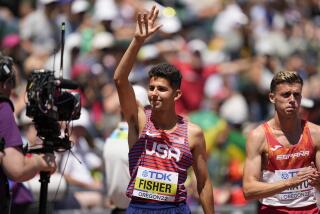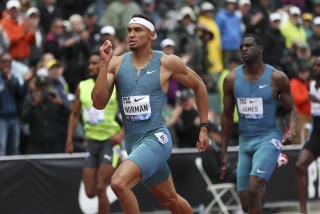Not Running for Office : As Olympics Approach, Morceli Has Politics on His Mind
- Share via
The loneliness of the long-distance runner has ceased to be a problem for Noureddine Morceli. Actually, a little solitude would be a welcome respite.
But that’s a luxury he has learned to do without. Duty, responsibility, patriotism--these, he has decided, must come first.
Morceli will carry the hopes and dreams of his 25 million Algerian compatriots wherever he goes between now and early August, when the Olympic 1,500-meter final is run.
In a country torn by political strife, sports has become an important diversion and source of national pride. Much has been made of Morceli, the world’s top-ranked 1,500-meter runner the last two years and a gold-medal favorite heading into this summer’s Games at Barcelona.
“Many people expect many things from me,” Morceli said from Algiers. “It’s a big responsibility. Everyone is looking to me.”
But although Morceli, 22, has accepted the burden, he has not found it easy to handle.
“Some people don’t understand,” he said of the demands of competing at a world-class level. “Some people expect too much, especially because I am young. If I was 33 or 34, it would be different.”
It would also be different if Algeria were not facing its most severe crisis since it won independence from France three decades ago.
In the first round of national elections last December the Islamic Salvation Front (FIS), the only Muslim fundamentalist political party legalized in the Arab world, gained 3.5 million votes, and 188 of the 430 National Assembly seats. That vote left the party poised to end the ruling National Liberation Front’s 30-year hold control of the government in the second round of parliamentary balloting.
But on Jan. 11, five days before balloting was scheduled, military leaders intervened, nullifying results of the December election, disbanding the National Assembly, forcing the resignation of reformist President Chadli Bendjedid and installing a five-member High State Council.
Leaders of the coup moved quickly to arrest thousands of Islamic militants, or “bearded ones,” as they are known in Algeria. Parliamentary and presidential elections were postponed until at least 1994, and last month, Algeria’s Supreme Court banned the FIS.
Despite the military’s action, occasional exchanges of gunfire between militants and members of the security forces are not uncommon in the cities, and larger-scale skirmishes have occurred in rural areas. Nearly 200 have died and scores more have been wounded since late January as a result of the violence.
Morceli, who spends much of the year training in the hills outside Mexico City or racing throughout Europe and the United States, has tried to keep his feelings private.
“I don’t want to talk about politics,” he said. “I am a sportsman, that is my job. I am not a politician. I follow politics, but I am not a political person.”
Still, he seems frustrated about the situation.
“What has happened in Algeria is not good,” he said. “It makes me very, very sad. People think that if a Muslim government takes the lead, they will do bad things. But I don’t think that will happen .”
Morceli, a sinewy 5-feet-8 and 137 pounds, is carrying the expectations of this divided nation.
But it was not always that way.
He first drew attention as a runner in 1988, when he finished second in the 1,500 meters at the World Junior Championships. That fall, he enrolled at Riverside City College to train under Coach Ted Banks, who developed a number of world-class African runners at Texas El Paso.
In his two years at Riverside, Morceli won four state track titles and shattered national community college records at 1,500 and 5,000 meters.
Morceli left California in 1990, when his community college track eligibility expired. He has since been helped by Amar Brahmia, an Algerian attorney who serves as his manager, and older brother Aderrahme, ranked seventh in the world at 1,500 meters in 1977, who is his coach.
“It’s very nice to have someone from your family take care of you,” Noureddine said. “It’s very normal. This is our tradition.”
But Morceli quickly outdid his brother, becoming the world’s top-ranked middle-distance runner by the time he was 20. He is the youngest person to earn that distinction.
Yet, he may not be the most talented athlete in his family. Younger brother Ali, 19, one of eight siblings, has run 3 minutes 47 seconds for 1,500 meters--equivalent to a 4:05 mile--and 1:48 for 800 meters. He is expected to compete for a medal in the World Junior Championships this summer.
“He’s good, but he doesn’t have the motivation,” said Morceli, whose twin sister also was a talented runner before quitting to concentrate on college. “He needs to get used to competition.”
Competition is something Morceli has lacked for most of his career as well. Last year, he won the 20 races he entered, running a world indoor-best and winning world championships at 1,500 meters indoors and outdoors in the process. Already this season he is 5-0, including a second indoor mark.
He has not lost a race at a mile or 1,500 meters since September of 1990. But despite that impressive record, last summer’s victory in the World Championships 1,500 meters in Tokyo was the race that affirmed his reputation as the most celebrated athlete in his homeland.
“Algeria never had a champion before,” Morceli said.
He was honored across North Africa, where he was named the continent’s top athlete for 1991. In Senegal, President Abdou Diouf, mindful that 80% of his constituents are Muslims as is Morceli, put on a gala reception attended by diplomats from 60 nations. Morceli also was awarded the Algerian medal of honor, $80,000 in cash and a new home.
“It was something you can’t imagine,” Morceli said at the time.
But all that will be forgotten compared to the reception he can expect should he win at Barcelona.
“The Olympic Games are more important than the World Championships,” he said.
The bonuses and endorsement opportunities of a gold medal could be worth more than $1 million, which will go a long way in a country with a per capita income of less than $2,500. Mindful of that, Morceli’s goal between now and Aug. 8, the date of the Olympic 1,500-meter final, will simply be to concentrate on that race.
“If you have your mind full of other things, you never run good,” he said. “I have to concentrate on running. It’s hard with the politics, but I always try to keep my mind clean.”
Such single-mindedness is more difficult to achieve when Morceli is away from home, as he is most of the time. His favorite training bases are St. Moritz, in the Swiss Alps, and the hills outside of Mexico City, which is where he plans to prepare for the Olympics.
“What is hard is that, when you are out of the country, you do not exactly know what is going on,” he said. “You hear things. You see things on television and you read in the papers. It makes you wonder what is happening.”
Morceli’s mother and father, a retired factory worker, live in Tenes, a small town 120 miles west of the capital along the Mediterranean coast. They try to keep Morceli informed during their telephone conversations.
For the time being, the situation remains tense. In such an atmosphere, even something as unpredictable as an Olympic final can appear certain in comparison. Which is why many Algerians are counting on Morceli to win.
“Everyone knows who I am. People look up to me now,” he said. “Politics? It doesn’t matter, politics. I’m not from this party or that party.
“I’m an Algerian guy.”
More to Read
Go beyond the scoreboard
Get the latest on L.A.'s teams in the daily Sports Report newsletter.
You may occasionally receive promotional content from the Los Angeles Times.







